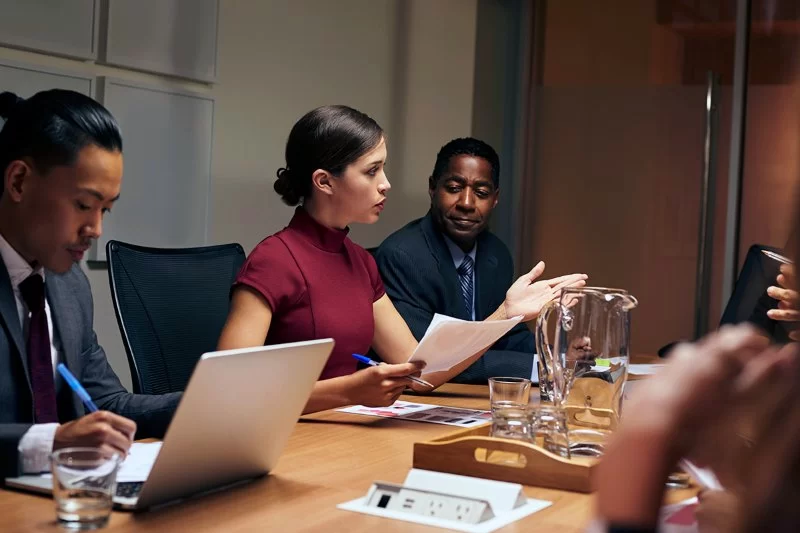- understanding-what-happens-in-a-legal-deposition
- who-is-present-during-a-deposition
- the-structure-and-flow-of-a-deposition
- real-deposition-case-an-eye-opener
- common-mistakes-and-how-to-avoid-them
- why-legal-guidance-matters-fred-miller-lawyer
1. Understanding What Happens in a Legal Deposition
If you’ve ever asked yourself what happens in a legal deposition, you’re not alone. For many people, depositions are the most intimidating part of a legal process. They’re formal, they’re recorded, and what you say could affect the outcome of your case. Simply put, a deposition is a sworn, out-of-court testimony taken during the discovery phase of a lawsuit. It’s where attorneys gather information, test witness credibility, and prepare for trial—sometimes influencing whether a case settles or proceeds.
2. Who Is Present During a Deposition?
2.1 Key Participants You Should Expect
The typical deposition room includes the deponent (the person being questioned), attorneys for both sides, a court reporter who transcribes the session, and sometimes a videographer. Judges are not present. In some cases, especially in high-stakes matters, expert witnesses or legal assistants may also attend.
2.2 Your Lawyer’s Role
Your attorney is there to protect your rights. While they cannot answer for you, they can object to improper questions and ensure the process is fair. A seasoned legal professional, such as those at Fred Miller Lawyer, will also prepare you thoroughly in advance—one of the most valuable parts of legal defense.
3. The Structure and Flow of a Deposition
3.1 The Oath and Ground Rules
The deposition begins with the court reporter administering an oath to tell the truth. The attorney asking the questions will usually start with a few ground rules: speak clearly, don’t guess, and wait until the question is finished. Everything is recorded word-for-word.
3.2 Questioning Phase
This is where things get detailed. Questions can cover anything relevant to the case, from personal background to incident specifics. Don’t be surprised if the same question is asked in different ways—lawyers use this to test consistency. Honesty is crucial, but brevity helps. “Yes,” “No,” or “I don’t know” are often the best answers.
3.3 Objections and Clarifications
Your lawyer may object to certain questions—perhaps they’re misleading, too broad, or irrelevant. However, unless the question is outright abusive or violates privilege, you’ll likely still have to answer. Objections are recorded for the court to address later.
4. Real Deposition Case: An Eye-Opener
Consider the case of Marcus, a contractor involved in a personal injury lawsuit. He was confident walking into his deposition—until opposing counsel began questioning him about a social media post he hadn’t even remembered. His nervousness led to long-winded answers, which created contradictions. Fortunately, his attorney from Fred Miller Lawyer had prepped him for such moments. They had reviewed all public-facing content, anticipated questions, and coached Marcus on how to stay composed. His preparation paid off, and ultimately, the case was dismissed thanks to his consistent deposition performance.
5. Common Mistakes and How to Avoid Them
5.1 Over-Explaining or Guessing
People often try to justify or clarify too much, which can open doors to more difficult follow-up questions. Stick to the facts. If you don’t know the answer, say so—it’s better than guessing and being wrong later.
5.2 Getting Emotional or Defensive
Depositions can feel personal, especially if the opposing lawyer is aggressive. Staying calm is your best defense. If you feel overwhelmed, ask for a short break to regain composure. That’s your right.
5.3 Talking Too Fast or Unclear Speech
Everything is being transcribed. Speak clearly and avoid using gestures or nods alone. What seems obvious in conversation might be confusing on paper.
6. Why Legal Guidance Matters: Fred Miller Lawyer
6.1 Preparation is Key to Success
A successful deposition starts long before the first question is asked. The team at Fred Miller Lawyer specializes in strategic prep sessions, helping clients understand what to expect, how to respond, and how to maintain credibility under pressure.
6.2 Protection Against Traps and Tactics
Opposing counsel might try to confuse you, twist your words, or bait you into saying something you don’t mean. With professional legal support, you’ll learn how to spot these tactics and respond appropriately.
6.3 Confidence Through Understanding
Clients who walk into depositions with legal coaching feel empowered. They know the process, understand their rights, and have a game plan. Whether you're a plaintiff, defendant, or witness, Fred Miller Lawyer provides the calm, clarity, and legal strength you need in such high-stress settings.
Knowing what happens in a legal deposition is more than trivia—it’s crucial knowledge for anyone facing litigation. With the right preparation and expert guidance, it doesn’t have to be overwhelming. It can even become a strong point in your legal strategy.


 andy miri attorney
andy miri attorney law offices of dolly z hassan photos
law offices of dolly z hassan photos 1700 lincoln denver
1700 lincoln denver auto accident attorney manassas
auto accident attorney manassas raytsin law firm
raytsin law firm oliver s storch attorney at law new york photos
oliver s storch attorney at law new york photos